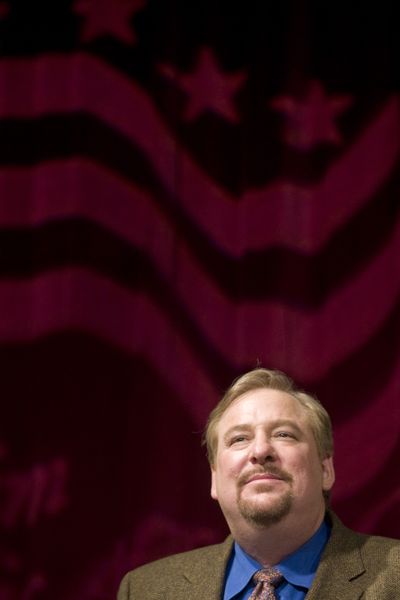Evangelist aims to show creeds through deeds

Could California pastor Rick Warren possibly be everywhere at once?
It sure seems like it. There may be no escaping the conservative, evangelical Warren’s campaign to stamp his vision of civil Christian discourse and social action on world culture.
Maybe you saw him in August when he interviewed both presidential candidates on moral and social questions in a televised forum at his California megachurch, Saddleback Church (22,000 in attendance on Sundays).
He’s been in the news again this month with Barack Obama’s decision to have him give the invocation at the president-elect’s inauguration – which drew protests from the Human Rights Campaign, a gay, lesbian, bisexual and transgender rights group.
Warren angered the gay community by endorsing California’s successful Proposition 8, which amends the state constitution to declare that marriage is only between a man and a woman.
He seems to be in the pulpit one minute, in Washington, D.C., or Rwanda the next. His work is in every bookstore, Wal-Mart and Sam’s Club. Online. On CD. On DVD.
Indeed, tell him about any new mode of communication, “and I’ll be there,” Warren said in a recent interview.
The conversation at a Capitol Hill hotel was sandwiched between an event where he presented President George W. Bush with a newly created medal honoring Bush’s efforts to combat AIDS, and a New York media swing to promote his newest inspirational book/CD, “The Purpose of Christmas” (Howard Books, 2008, $17.99).
The very word “purpose” is part of the Warren franchise. His Bible-reading handbook, “The Purpose Driven Life,” has sold 30 million copies and financed Warren’s ever-expanding goals.
These include his civil forums and his international PEACE Coalition (Promoting reconciliation, Equipping servant leaders, Assisting the poor, Caring for the sick and Educating the next generation), which works with public, private and religious sectors. Warren initiated the plan after his wife, Kay, was drawn to help AIDS orphans in Rwanda.
To reach beyond his network of 400,000 pastors in 162 countries, Warren has a new deal with Reader’s Digest to introduce and edit a new quarterly magazine this winter, Purpose Driven Connection, tied in with a social networking Web site.
In this way, Warren the pastor is most like Billy Graham, the evangelist, says Grant Wacker, professor of Christian history at Duke University’s Divinity School.
Both are willing to work with anyone, without an ideological litmus test, as long as they aren’t asked to give up their own convictions.
“It’s either very courageous or it’s very thick-skinned or both,” Wacker says.
Warren’s critics aren’t shy. Christianity Today observed that he has been pounded for swapping out the “P” in PEACE from its original tag: planting churches.
Michael Horton, author of a new book, “Christless Christianity” (Baker Books, 2008, $19.99), scoffs that Warren promotes “deeds, not creeds” – which makes the professor of systematic theology at Westminster Seminary in Escondido, Calif., wonder, “What’s the point of the Gospel?
“God didn’t become flesh and die on a cross for me to know I need to care about the environment or I need to look after my neighbor,” Horton says.
Warren says it’s inevitable that people would take potshots at an ever-growing target. But he’s annoyed that anyone questions his evangelical credentials.
“Of course, we need creeds,” Warren says. “We don’t need to change what we believe. We need to change how we behave.
“It’s not creeds ‘or’ deeds. I didn’t say that. It’s creeds ‘and’ deeds. You say you believe. Show me your beliefs by what you do.
“What I am not is a fundamentalist. You become a fundamentalist when you stop listening. There are all kinds of fundamentalists,” he says, listing Christian, Muslim, Jewish, atheist, even secular forms.
“I don’t happen to agree with any of them,” Warren says.
He never stopped planting churches, he says, but as he spoke around the world, he realized government, business and nonprofits could all share in efforts to reconcile global conflict.
“All of a sudden,” he says, “I started having people of goodwill who were not Christian or not church members saying, ‘We’d like to do that. We’d like to partner with you on helping the poor. We’d like to help end AIDS. We’d like to help end corruption and injustice.’
“So I started making the appeal for people of goodwill – whether they happened to believe, as I do, that Jesus Christ is the son of God, or not – to work together on the areas where we can work together, and not worry about the areas where we can’t.”
For example, says Warren, “We’ll work with anybody who wants to stop AIDS.” And that, he adds, “really makes the fundamentalists mad.”
“But when people say Saddleback is not a evangelistic church,” or that Warren is not standing for Christ all the time, he says, “there’s a spiritual term for that.
“It’s when you cross an abalone with a crocodile. It’s a crock of baloney.”